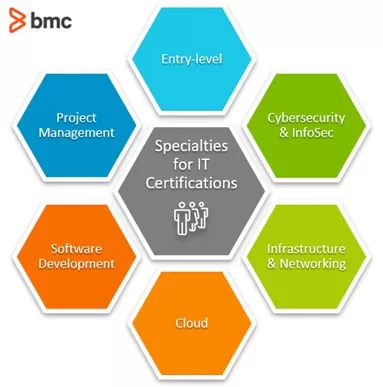Introduction to IT Certifications
There’s something just so tempting about course completion certificates… the allure of seeing one’s name in beautiful bold Kunstler Script on a neatly designed canvas attesting to one’s latest professional feat. It’s the stuff LinkedIn update dreams are made of!
But beyond the celebratory likes and claps of social media sites where people congratulate one another for accomplishing certifications in each stream, I can’t help but wonder if these certifications really do make a difference? Especially in the IT sector that I’m a part of?

I make this distinction simply because unlike other disciplines – say digital marketing for instance – IT is a highly technical sphere where the idea of continuous “professional upgrade” is something that’s been around forever. IT professionals are almost always “learning” something new. Something that’s likely to be the Next Big Thing. Something that they must learn or risk becoming professionally obsolete.
And often it’s how these courses and certificates are sold to potential candidates by vendors. There’s nothing subliminal about their messaging.
And so, there are courses for everything one can possibly imagine. For everyone, regardless of one’s professional age. If you’re in IT, there’s a professional certification for you. Heck, there are a dozen!
There are so many options, so many varieties that even the most studious and professionally ambitious types are often left wondering, “Where do I begin?” and “Is it even worth it?”
These are important questions to ask since professional certifications don’t come cheap and can cost upwards of hundreds if not thousands of dollars. And besides money, they can take up a lot of your time and energy.
So how does one decide? How does one arrive at the pros and the cons of professional certifications? For anyone – I’m sure there are many – grappling with these questions it’s important to look at advantages and disadvantages of pursuing professional IT certifications. Here’s a rundown of both:
Advantages of Obtaining Professional IT Certifications
- Validation of Knowledge: Professional certifications can help you validate your skills for existing and future employers. These credentials establish a baseline of knowledge that is consistent not just across the industry locally but across the world.
- Increased Career Flexibility: Many IT professionals maintain multiple certifications. This helps not just sharpen their existing skills but also diversify and add new ones. A wider set of professional skills increase your employability quotient and lend you the flexibility to switch disciplines and get out of a career rut.
- Recognition & Pay: The vendor claims of enhanced recognition and improved pay aren’t completely made-up. Professional IT certifications, the good ones anyway, bring with them scope for increased recognition and fairer pay.
- Enhanced Marketability: Once you earn a Certification from a specific vendor, you join a select group of highly skilled and certified individuals. Sometimes this gives you access to professional networks which are often hard to get into. Besides the knowledge sharing, such peer groups can also make you more marketable from a career standpoint.
- Increased Confidence: After earning one or more certifications, especially from the same vendor, your professional credibility shoots up which in turn boosts your confidence. Higher confidence allows you to perform better and ends up benefiting your organization.
Disadvantages
- Too many vendors: The Professional IT Certification space has a vendor problem in that there are just too many of them going around! And added to this problem of plenty is the fact that there’s just no standardization in sight. No board or accrediting agency to validate the training imparted by the vendor or the certification available. Vendors are often biased towards their own certifications and every day there’s a new upstart vendor out quietly devaluing many of the established certification paths.
- Content of Certifications: Based on my own experience, I see that there’s far too much overlap in the content provided by the vendors. Many try and support their own certifications even when the content of other vendors is nearly the same. Thanks to this, many certifications may not be useful in the future.
- Shorter Lifecycle: With technologies evolving at a furious pace and advent of newer, smarter ways of doing things means that any certification you do today, is likely to get outdated in no time. In IT the only way to keep a certification relevant is to do another certification and another and so on. Getting off the certification treadmill is not easy!
And that’s that! There are no easy answers to whether Professional IT Certifications are worth doing. Sure, on the face of it, they do offer some advantages. On the flip side though they are not necessarily a one-and-done affair given the ever-changing nature of the IT industry.
Certifications, according to me, are the starting line to your skills. And you need them to keep your skills current. But what you really need is to build expertise through hands-on experience and knowledge gained in the proverbial mud of the daily grind. That’s the constant learning which really makes the difference!


